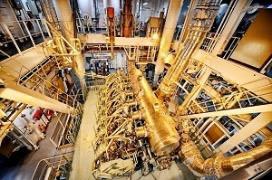
2 minute read
ZESTAS
from CSI Autumn 2021
by Maritime-AMC
A MESSAGE OF HOPE
The Zero Emissions Ship Technology Association (ZESTAs) says the recently published United Nations Framework Convention on Climate Change Climate report is “a message of hope” and believes the authors have made it abundantly clear that it is possible to limit further warming within the next two decades by pursuing the “very low emissions scenario”.
According to the report, there is no other option: it is global society’s obligation to act now with “drastic, rapid and large-scale reductions in greenhouse gases to limit global warming to 1.5°”, simply because it can.
Helping the industry to achieve these goals, ZESTAs is holding a “Ship Zero – Charging to True Zero” workshop on 1-3 November in Glasgow, coinciding with COP 26 in the city. ZESTAs’ workshop will be the first shipping event to align with the Intergovernmental Panel on Climate Change “very low emissions scenario”, by not contemplating the use of fossil fuels or any greenhouse gas-emitting fuel or technology.
“The simple truth is the time for discussion is past – nothing remains but for us to act,” observes Brent Perry, chairman of ZESTAs board of directors. “Whatever your beliefs, whatever your passions, whatever your politics, insuring that we, as a society are no longer contributing to the end of life as we know it is imperative.
“This century is about reckoning – the morals, purpose and goals of society must align with the common good in every aspect of life. Sustainability is not just a goal, but a social imperative that transcends our societies and presents us with both opportunities and obligations – and future societies will either praise us or damn us for our actions today,” he continues.
Only truly zero GHG emissions systems, solutions and technologies will be considered at this workshop. ZESTAs states the technology to achieve true zero in all sectors of shipping exists today, but that weak or misaligned policies and lack of finance are preventing these technologies from upscaling, achieving economies of scale and penetrating the wider market.
“We need to stop throwing the ball out to 2050, investing in half measures that won’t get us where we need to be,” says Madadh MacLaine, ZESTAs secretary general. “We need to invest in true zero now, upscale and shoot for 2030. If we don’t, we have no chance of stopping warming anywhere near 1.5°. The IPCC report clearly states we’ve got a shot.
“We need to take that shot and act now to change policy and finance, allowing zero emissions ship technologies to get to market before 2030,” she says.
The Ship Zero workshop will feature technical presentations, followed by discussions and brainstorming sessions, bringing together shipping stakeholders from innovation, policy, finance, infrastructure, energy and the wider shipping sector to combine solutions into an actionable road map.
“Our intention is that the outcome of Ship Zero is an action plan, a navigational chart to true zero with waypoints based on realisable actions, available technologies, and implementable policies that will keep warming below 1.5°,” says MacLaine.
Wind propulsion and other methods will be considered. The Ship Zero workshop will demonstrate that marinised battery and hydrogen systems are market ready at multimegawatt scales, and that wind propulsion is being rolled out across the world fleet and delivers significant emissions reductions.
To find out more about Ship Zero, visit: zestas.org/ship-zero










